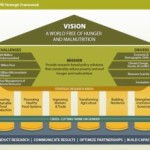In the past few decades, food-related challenges like climate change and food and nutrition security coupled with other social and political issues have led to conflict and unrest on both the national and regional scale.
Climatic shocks are considered to be one of the root causes of conflict, especially in resource-constrained settings. At the same time, conflicts tend to exacerbate existing vulnerability, leading to poverty‐conflict traps at the household, community, and national levels. In their conference brief, Margherita Calderone, Derek Headey, and Jean-François Maystadt review the research about the impact of climate change in the Horn of Africa – which includes Djibouti, Ethiopia, Kenya, and Somalia – and find that warming and continued population growth already appear to be producing more frequent catastrophic events.
In order to combat the growing threat of climate change and increase resilience, the authors outline several policy options, particularly focusing on the region’s pastoralist population who are most vulnerable. These policy options include conflict prevention and mitigation, emergency assistance and safety nets, interventions to reduce ex ante and ex post exposure to climactic shocks, and broader development efforts aimed at building long-term resilience.
In a related conference brief, Olivier Ecker explores the increasing role of food and nutrition insecurity as a driver of civil conflict. In recent history, major political uprisings in several Arab countries, also known as the “Arab Awakening,” resulted from people’s dissatisfaction about their governments’ inaction to cope with rapidly increasing food insecurity, deteriorating living standards, growing inequality, and high unemployment – combined with general disaffection with state governance.
Focusing on the case of Yemen – a country where civil unrest led to a violent revolution in 2011, Ecker describes two local projects that aim to reduce the risk of civil unrest by increasing the opportunity cost of conflict participation in poor, rural communities. One, called the Dhamar Participator Rural Development Project, was designed to improve the food security of subsistence farmers, to increase family incomes, and to improve the living conditions of small farm households and village communities in the Dhamar govornate. The other, the Al‐Dhala Community Resource Management Project (ADCRMP), aimed to support sustainable and equitable growth of rural living standards and greater livelihood security for vulnerable households in the Al Dhala governorate through better management of their resource base.
Aside to these small-scale, development projects, Ecker also emphasizes the urgent need for “economic policy reforms and large-scale development interventions that address the causes underlying the current crisis. At the policy level, more effort needs to be made in this direction without neglecting the ongoing political transition process. At the program level, successful interventions urgently need to be scaled up, utilizing the experiences from experiences from recently completed and ongoing projects.”
Addressing the sources of these national and regional conflicts will be imperative for building resilience against future shocks.






please provide the finings of impact studies ofdifferemnt projects